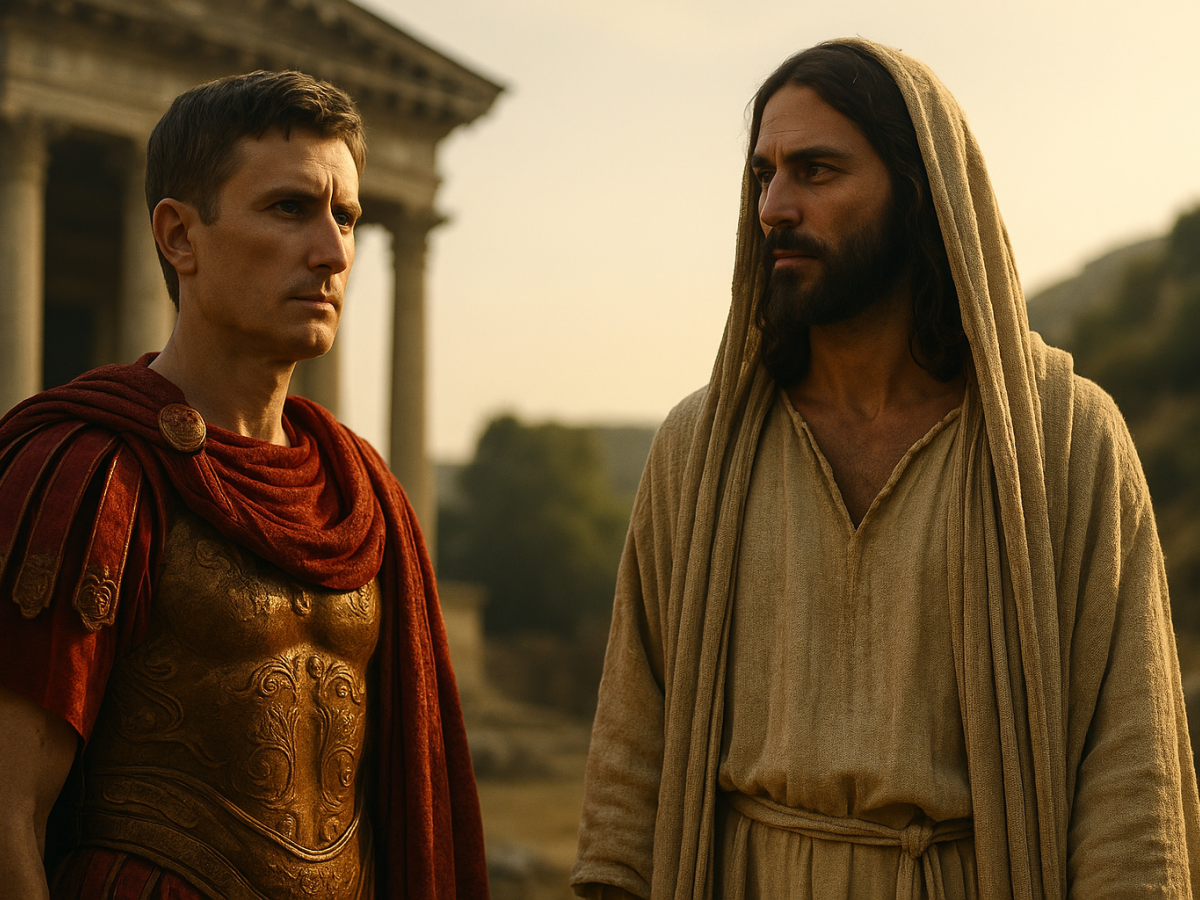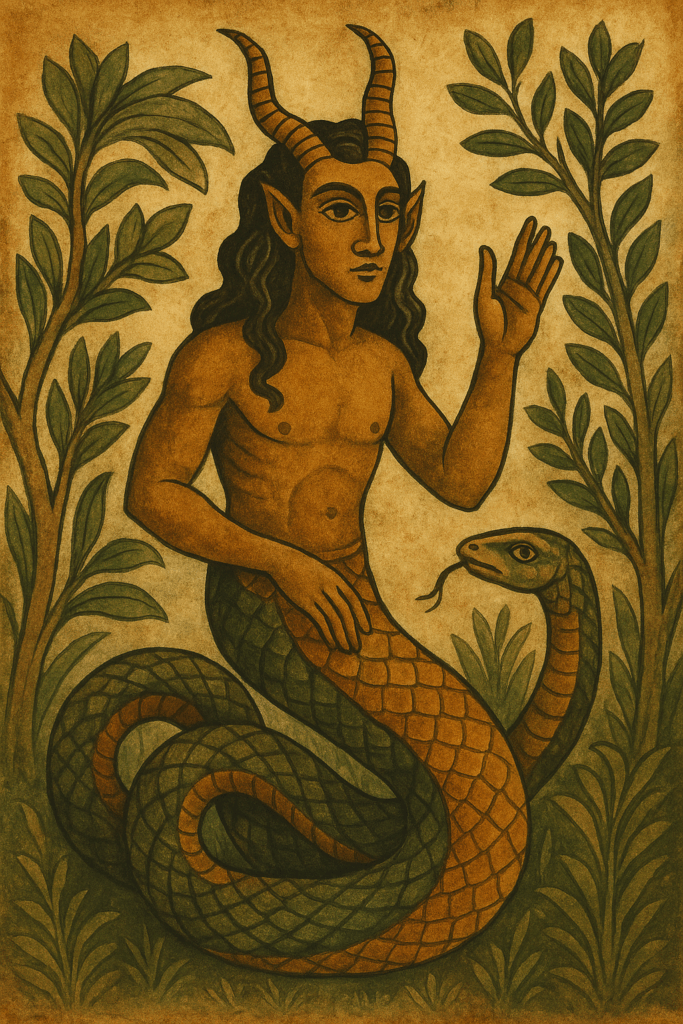
Son of God: Augustus or Yeshua
The story of Caesar Augustus was carefully crafted to present him as more than human. In the volatile years after Julius Caesar’s assassination, Rome needed a stabilizing figure who could rise above the bloody rivalries of ambitious men. Octavian, Caesar’s grand-nephew, was adopted into Caesar’s line and transformed by propaganda into Caesar’s rightful heir. This adoption was not a trivial legal formality. With Julius Caesar declared divine by the Senate, Octavian inherited the title divi filius, Son of God. In a world where bloodlines, divine favor, and political spectacle intertwined, this title mattered. It secured in the public mind that Augustus stood in alliance with the gods themselves, chosen to carry their will into the world.
Myth and the Seed of the Serpent
But the story did not stop with adoption. Roman imagination reached back further to anchor his origin in myth. Legends whispered that his mother, Atia—niece of Julius Caesar—had been impregnated by the god Apollo. One Roman tale went so far as to claim that Apollo came to her in the form of a serpent. That image is chilling when read through the lens of Scripture. It makes Augustus, quite literally, the seed of the serpent—his kingdom built on conquest, domination, and fear. Yet Genesis had promised another Son, the seed of the woman, who would crush the serpent’s head. Two sons. Two seeds. Two kingdoms. One rules by the sword; the other by the cross.
Augustus and the Roman Script for Greatness
And on the human side, Augustus’ lineage traced through generations of civic leaders, military commanders, and magistrates, men who had demonstrated Roman masculine virtue on the battlefield and in the Senate. Adoption, divine begetting, and distinguished ancestry—three strands of legitimacy woven together—fashioned Augustus as the man destiny demanded. Rome proclaimed him the bringer of peace, the embodiment of divine will, and the one through whom the world would be set in order.
This was the Roman script for greatness. Elite men became larger than life by blending human and divine origins. Power was validated by myth, ancestry, and achievement. Augustus’ ascent to power was not just about politics; it was about cosmic legitimacy. He was Caesar’s heir, Apollo’s son, and the scion of a noble family. With such credentials, who could doubt his right to rule?
The True Son of God Enters the World
Into that same world stepped Yeshua of Nazareth. He too bore the title Son of God, but in a way that undercut Rome’s propaganda at its very root. Where Augustus’ claim was propped up by Senate decrees, myths of lustful gods, and family pedigree, Yeshua’s was rooted in an entirely different story. His adoption was not by a deified Caesar but by the living God of Israel. At his baptism in the Jordan, a voice from heaven declared: “This is my beloved Son, in whom I am well pleased.” That moment was not a political invention; it was divine proclamation. The title Son of God in his case was not the language of imperial propaganda but the language of covenant kingship. It echoed the words spoken over Israel’s kings in the Psalms: “You are my Son; today I have begotten you.”
Contrasting Conceptions: Apollo and the Spirit
The conception stories diverge even more dramatically. Augustus’ legend claimed the intrusion of Apollo upon a woman of noble stock. Yeshua’s story spoke of the Spirit overshadowing a humble virgin from an obscure village in Galilee. No temples adorned Nazareth, no Senate decrees celebrated Mary’s womb. Instead, heaven’s glory clothed itself in humility. The incarnation was not a god’s lust but God’s love, not the grasping of power but the self-emptying that Paul later described in Philippians 2.
The Genealogies of Power and Grace
And what of family pedigree? Augustus pointed to generations of generals and statesmen. Yeshua’s genealogy included the scandal of Tamar, the outsider Rahab, the foreigner Ruth, the adulterous union of David and Bathsheba, and the humble obscurity of Mary and Joseph (Matthew 1). His line testified to God’s redemptive grace. Where Rome sought prestige in unbroken legacies of masculine dominance, the Messiah’s ancestry revealed God’s power at work in weakness, scandal, and exile.
This is precisely what made Yeshua’s claim as the true Son of God so dangerous, so subversive, and ultimately so explosive. He embodied a different kingdom. Augustus ruled by domination; Yeshua ruled by surrender. Augustus enforced “peace” (the famed Pax Romana) through military might; Yeshua offered shalom through the blood of the cross. Augustus’ empire thrived on corruption, violence, and fear; Yeshua’s kingdom was built on service, forgiveness, and love. To proclaim Yeshua as Son of God in Caesar’s world was not a pious religious claim. It was a political statement, a rival proclamation of allegiance to another King. Such language could and eventually did get you killed.
The Clash of Empires
The contrast between the two kingdoms could not be starker. Rome sought to order the world through conquest. The kingdom of God turns the world upside down. Rome exalted those who grasped power; God exalted the one who emptied himself. Rome enforced submission through fear; Yeshua invited surrender through love. Rome promised peace through the sword; Yeshua secured peace through the cross.
The Enduring Kingdom of God
And herein lies the challenge. Every age has its Caesars—leaders and systems that seek to claim divine sanction for their rule, promising peace and stability while demanding allegiance and control. They may not call themselves sons of Apollo or claim descent from Julius Caesar, but they still traffic in myths of greatness, the cult of power, and the worship of empire. Against them all, the Gospel still speaks the same subversive word: Jesus is Lord, and Son of God and Caesar is not.
The kingdom of God exposes the emptiness of the world’s empires. It calls us to rethink power, authority, and victory. Power comes not in self-assertion but in surrender to the will of God. Authority is not seized but received through service. Victory is not achieved through corruption and violence but through self-giving love. The cross, Rome’s tool of humiliation, became the throne of the world’s true King.
The Kingdom That Will Not Fall
Augustus’ empire crumbled into history, one among many that have risen and fallen. But Yeshua, the true Son of God, His kingdom endures as reality. His resurrection proved that his way—the way of surrender, service, and sacrificial love—is stronger than the sword, greater than Caesar, and victorious over death itself.


Leave a Reply